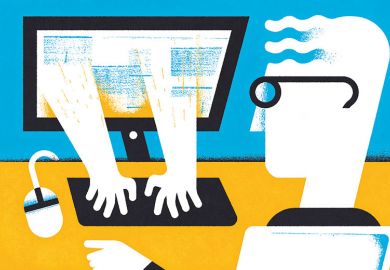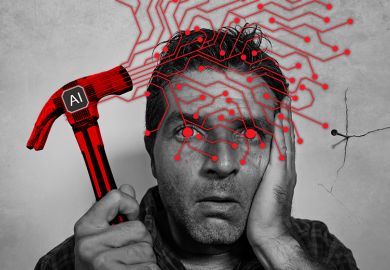Students who admit that they cheat say they are most likely to do so in exams, even though staff mostly detect cheats’ handiwork in written assignments.
And while text-rich projects are fertile ground for academic misconduct, students who write their assignments under exam conditions are no more likely to be caught cheating than those who undertake their projects far from invigilators’ eyes.
New research at the University of South Australia has raised doubts over the “common sense discourse” that universities can thwart academic misconduct by jettisoning essays in favour of exams. “While text-rich forms of assessment are not immune to contract cheating, exams are not inherently secure,” the researchers warn in the journal Higher Education Research and Development.
Lead author Rowena Harper said that cheats were “hiding in plain sight”, exploiting the “false sense of security” that exam conditions fostered. “Universities think that because the students are sitting at an isolated desk that they must be doing their own work,” she said.
“This data clearly indicates that’s not the case. Students have become quite good at disguising the extent to which they copy off one another and look at each other’s work.”
The researchers reanalysed the world’s largest contract cheating dataset to determine which types of assessment were most prone to cheating. They compared the findings of parallel surveys of more than 1,100 educators and 14,000 students, conducted as part of a larger project commissioned by Australia’s education department.
The study investigated different types of cheating – assignment outsourcing, exam assistance and exam impersonation – across a range of assessment scenarios. Of the 10 most common types of contract cheating reported by the students, seven involved surreptitious help in exams – with multiple-choice and short-answer exams proving most attractive to swindlers.
Conversely, the 10 most common types of cheating detected by staff all involved assignments passed off as other people’s work, with essays most frequently deemed fraudulent. Staff identified sham essays at twice the rate that students reported falsifying them. Meanwhile, students reported fudging multiple-choice exams and quizzes at more than twice the rate that staff reported catching them out.
Co-author Tracey Bretag said that there had been a “groundswell” against text-rich assignments as too easily fabricated. She said that a Twitter campaign with the hashtag “#DitchTheEssay” reflected a view that written assignments were too easily outsourced, and failed to acknowledge academics’ longstanding expertise in identifying this type of cheating.
“Short-sighted, simplistic solutions to the problem are not going to be effective,” she warned.
The study highlighted the low detection rates of cheating in practical and oral exams as particularly concerning. Dr Harper related “fascinating” cheating techniques that students had developed in dental exams, such as smuggling fake teeth into examination rooms.
Professor Bretag said that exams and practical tests had value. “But they’re not a panacea. The work we’ve been publishing has been showing that any type of task can be outsourced.
“Just because you’re doing an oral presentation doesn’t mean you didn’t get somebody else to do all the research, give you all the notes, [and] create the PowerPoint.”
She said that, when students gave wooden performances in oral exams, lecturers were often inclined to “cut them some slack”, assuming that they were poor presenters. “They’re not good presenters because they don’t even know the work,” she said.
Register to continue
Why register?
- Registration is free and only takes a moment
- Once registered, you can read 3 articles a month
- Sign up for our newsletter
Subscribe
Or subscribe for unlimited access to:
- Unlimited access to news, views, insights & reviews
- Digital editions
- Digital access to THE’s university and college rankings analysis
Already registered or a current subscriber?








